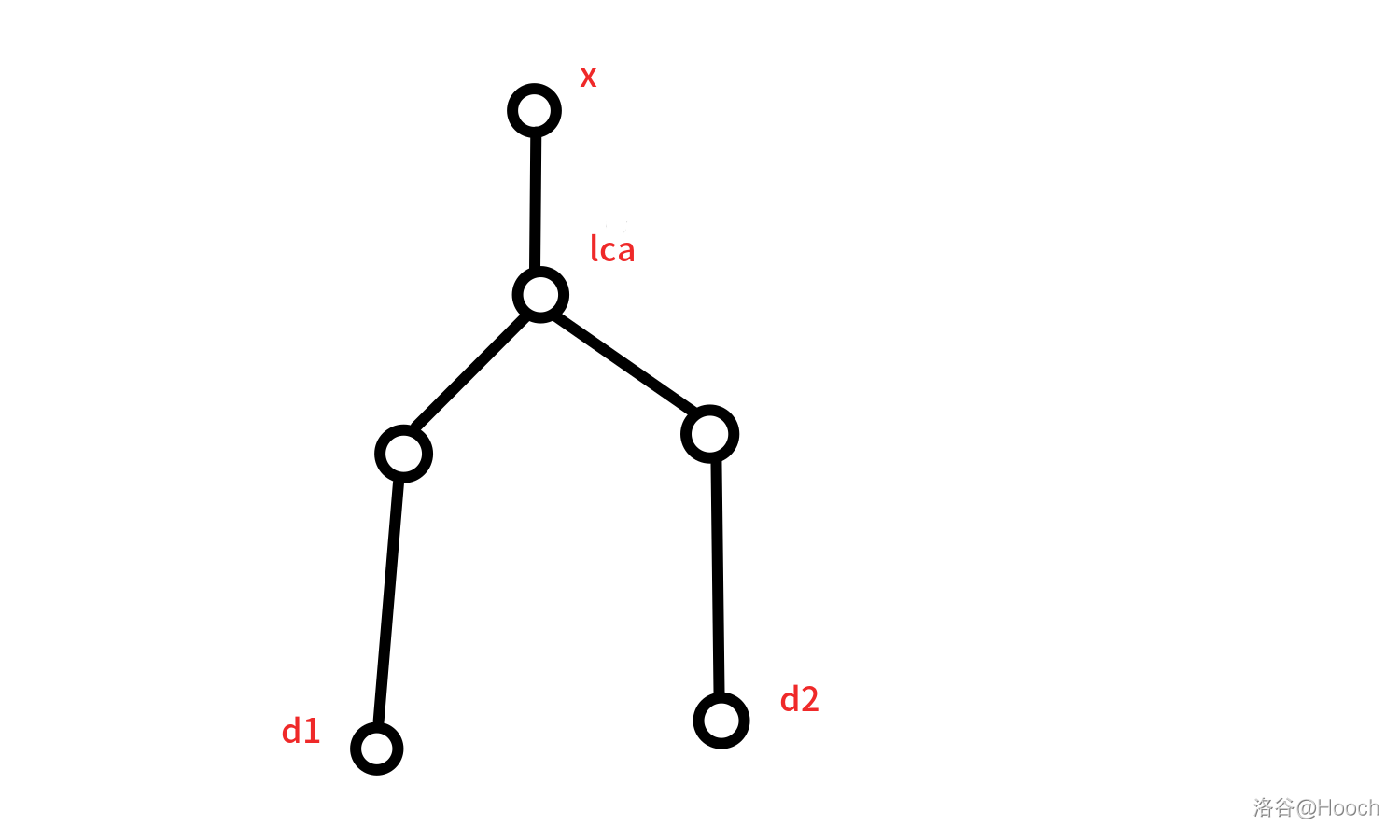Codeforces 1702G2 题解
题目大意
给出一个大小为 \(n\) 的树,\(q\) 次询问,每次给出一个大小为 \(m\) 的点集,判断是否有一条链覆盖这些点(这条链可以经过其他点)。
\(n,\sum m\leqslant 2\cdot 10^5\) , \(q\leqslant 10^5\)。
题解
考虑将 \(m\) 个点按树上的深度从大到小排序。
设 \(d_1, d_2\) 分别为链的两端,如果合法,显然链的某一端是排序后第一个节点,这里设 \(d_1\) 为这个节点。因为暂时不知道 \(d_2\) 是谁,于是暂时设 \(d_2 = -1\)。
考虑从前往后遍历这 \(m\) 个点,遍历到一个点 \(x\) 时,可能会出现如下情况:(令 \(\textrm{LCA}(u, v)\) 为 \(u, v\) 的最近公共祖先)
-
\(d_2 \ne -1\land \textrm{LCA}(x, d_1) = x\land \textrm{LCA}(x, d_2) = x\land \textrm{LCA}(d_1, d_2) \ne x\):此时长成这个样子:

不合法,直接跳出循环并输出NO。 -
如果上述命题不成立,且 \(\textrm{LCA}(d_1, v) = v\),那么 \(d_1 \gets v\)。
-
如果上述命题不成立,且 \(d_2\ne -1\land \textrm{LCA}(d_2, v) = v\),那么 \(d_2 \gets v\)。
-
如果上述命题不成立,且 \(d_2 = -1\),那么 \(d_2\gets v\)。
-
如果上述命题不成立,那么无解。
代码
#include <bits/stdc++.h>
#define rep(i, n) for (int i(0); i < n; ++i)
#define per(i, n) for (int i(n - 1); ~i; --i)
#define Rep(i, j, n) for (int i(j); i <= n; ++i)
#define Per(i, j, n) for (int i(j); i >= n; --i)
#define i64 long long
using namespace std;
namespace FastR {
const int Bf = 1e5 + 5;
char buf[Bf], *p1 = buf, *p2 = buf;
#define gc() (p1 == p2 && (p2 = (p1 = buf) + fread(buf, 1, 100000, stdin), p1 == p2) ? EOF : *p1++)
template <typename T>
void read(T &x) {
x = 0; int f = 1; char c = gc();
while (!isdigit(c)) f -= (c == '-') << 1, c = gc();
while (isdigit(c)) x = (x << 1) + (x << 3) + (c & 15), c = gc();
x *= f;
}
template <typename T, typename ...L>
void read(T &x, L &...y) {read(x); read(y...);}
void pt(char c) {putchar(c);}
template <typename T>
void write(T x) {
if (x < 0) pt('-'), x = -x;
if (x > 9) write(x / 10);
pt(x % 10 + '0');
}
}
using namespace FastR;
namespace FastM {
const int mod = 1e9 + 7;
int add(i64 x, int y) {
while (x + y >= mod) return x + y - mod;
return x + y;
}
int des(i64 x, int y) {
while (x - y < 0) return x - y + mod;
return x - y;
}
int mul(i64 x, int y) {
while (x * y >= mod) return x * y % mod;
return x * y;
}
}
const int N = 2e5 + 5;
int n, q, dep[N], fa[N][25]; vector <int> G[N];
void dfs(int x, int Fa) {
for (auto v : G[x]) {
if (v == Fa) continue;
fa[v][0] = x; dep[v] = dep[x] + 1;
Rep(i, 1, 20) fa[v][i] = fa[fa[v][i - 1]][i - 1];
dfs(v, x);
}
}
int lca(int u, int v) {
if (dep[u] < dep[v]) swap(u, v);
Per(i, 20, 0) if (dep[u] - (1 << i) >= dep[v]) u = fa[u][i];
if (u == v) return u;
Per(i, 20, 0)
if (fa[u][i] != fa[v][i]) {
u = fa[u][i];
v = fa[v][i];
}
return fa[u][0];
}
signed main(void) {
read(n);
Rep(i, 1, n - 1) {
int a, b; read(a, b);
G[a].emplace_back(b);
G[b].emplace_back(a);
} dfs(1, 0);
read(q); while (q--) {
int k; read(k);
vector <int> v;
Rep(i, 1, k) {int x; read(x); v.emplace_back(x);}
sort(v.begin(), v.end(), [&](const int &x, const int &y) {return dep[x] > dep[y];});
int d1 = v[0], d2 = -1, wj = 0;
Rep(i, 1, (int)v.size() - 1) {
if (~d2 && lca(d1, v[i]) == v[i] && lca(d2, v[i]) == v[i] && lca(d1, d2) != v[i]) {wj = 1; break;}
if (lca(d1, v[i]) == v[i]) d1 = v[i];
else if (~d2 && lca(d2, v[i]) == v[i]) d2 = v[i];
else if (!~d2) d2 = v[i];
else {wj = 1; break;}
}
printf(wj ? "NO\n" : "YES\n");
}
}


 浙公网安备 33010602011771号
浙公网安备 33010602011771号